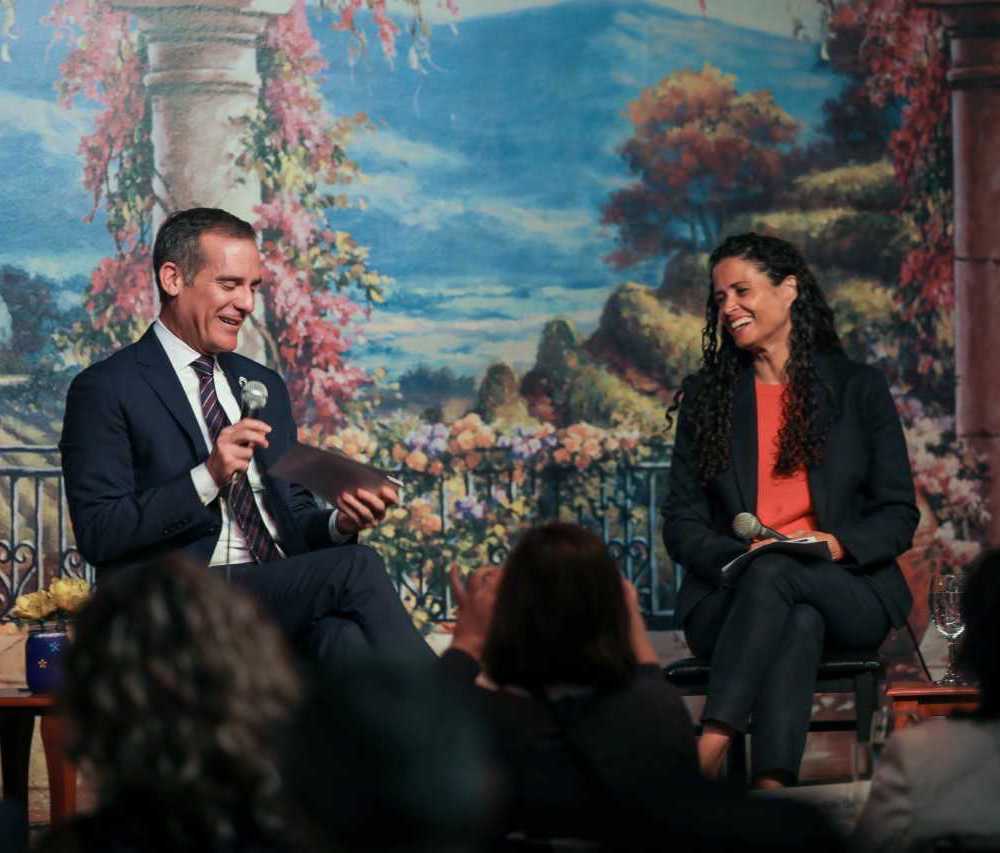Los Angeles Mayor Eric Garcetti is urging his counterparts throughout L.A. County to increase efforts to provide quality preschool and child care to their youngest residents, noting that less than half of the county’s low-income children are ready for school by age 5, with some not knowing how to hold a pencil or a book.
Addressing a recent meeting of L.A. County mayors, Garcetti said he is committed to wiping out the school readiness gap by 2025, which disproportionately places low-income children of color at a disadvantage throughout their academic careers. This gap can lead to higher rates of involvement with the criminal justice system and other negative outcomes, such as an increased risk for physical and mental illnesses.
 Picture courtesy of Mayor Garcetti’s Twitter, @MayorOfLA
Picture courtesy of Mayor Garcetti’s Twitter, @MayorOfLA
“I invite all the county mayors to join in,” Garcetti said at the meeting held in South El Monte, which was the latest in a series of sessions he holds periodically to both increase awareness of municipal issues and to share solutions.
Early childhood was a highlighted issue at the meeting, which featured a “fireside chat” between Garcetti and Kim Pattillo Brownson, First 5 LA’s vice president of Policy and Strategy. Their discussion focused on the effects of early childhood education and ways in which mayors of cities large and small can help boost the success of young children. The rate of children living in poverty in Los Angeles County is 23 percent, higher than the statewide average of 20 percent.
Early childhood has traditionally been seen as the purview of charity work, as well as more about day care than education, but Brownson said that attitude is changing. She highlighted a growing attention to the importance of early childhood as a factor in school and life success. “There is burgeoning awareness that K–12 cannot do it alone, that there needs to be significant investment in the front end,” she said. The benefits of quality preschool are well documented, Brownson noted. With two years of quality preschool, low-income children perform at levels of middle-class children. Additionally, quality preschool leads to a 32 percent drop in the number of poor children classified as special needs, she said, adding that for school districts special education costs double those of regular education. Moreover, preschool has a multiplier effect: Adults who benefitted from preschool teach those skills to their children. Brownson noted that by improving academic outcomes for low-income children, preschool is a key element in leveling the socioeconomic playing field. “Early childhood is absolutely social justice work,” she said.

Brownson indicated that one key way municipal leaders can help is by making it easier for licensed child care and preschools to operate affordably through designating their services as a “preferred home use,” which would involve actions such as waiving license fees and expediting the red tape required to open such businesses.
Private homes form a large part of the child care infrastructure, but many of those businesses operate informally, tending to serve households who earn too much to qualify for subsidized child care/preschool but do not earn enough to pay for child care/preschool equipped with trained staff and educational materials, Brownson said. “Only 12 percent of families have access to licensed child care,” she observed. “That is a staggeringly alarming number.”
Brownson, whom Gov. Gavin Newsom recently appointed to the State Board of Education, also urged city leaders to lock in dedicated funding sources for early childhood programs by drawing upon new revenue streams such as cannabis taxes.
Mayors applauded early childhood initiatives and agreed that cities should do more in this arena. “I think it’s fantastic,” said West Covina Mayor Lloyd Johnson, noting that regulations should be streamlined to make it easier for cities to open early childhood facilities.

Pasadena Mayor Terry Tornek said his city has pledged to become an Early Learning City by 2025. Pasadena has established an Office of the Young Child, located in the city library, to coordinate health care, social services, parenting resources and nonprofit allies geared toward children under 5. The office also administers the Early Development Index, a survey of young children to determine if intervention is needed. The office is “one of the most popular things we do in the city,” he said in reference to what resonates most with Pasadena’s citizens.
Other mayors noted that more outreach to parents is needed to teach them what their children are expected to know by the time they start kindergarten. South El Monte Mayor Gloria Olmos said that “some parents aren’t educated in how to educate their children.”
Public campaigns and free local events can be utilized to reach parents, Brownson pointed out. “So much of this is not expensive,” she said.
In Los Angeles, Garcetti has pledged to certify an additional 2,500 early childhood educators by 2025 through the California College Promise Grant, which is offered by the state community college system to low-income students in order to make community college tuition-free. He said that one of the crucial issues affecting the early childhood education field is the dearth of a trained workforce, due in part to low wages and benefits compared to K–12 schoolteachers. “There’s no question that it’s underpaid, under-skilled and under-resourced,” said the mayor.
Garcetti also urged other mayors to use their positions to lobby state officials for legislation and funding related to early childhood education and related causes. “Sacramento wants to hear from local government leaders,” he said.
Mayors and municipal leaders can do a lot, at many levels, to help their young residents, Brownson stated, noting that in a recent survey 70 percent of L.A. County residents agreed that the county should do more for children.
“City leaders have sway and influence over local communities,” she said. “Every parent wants their child to thrive.”








